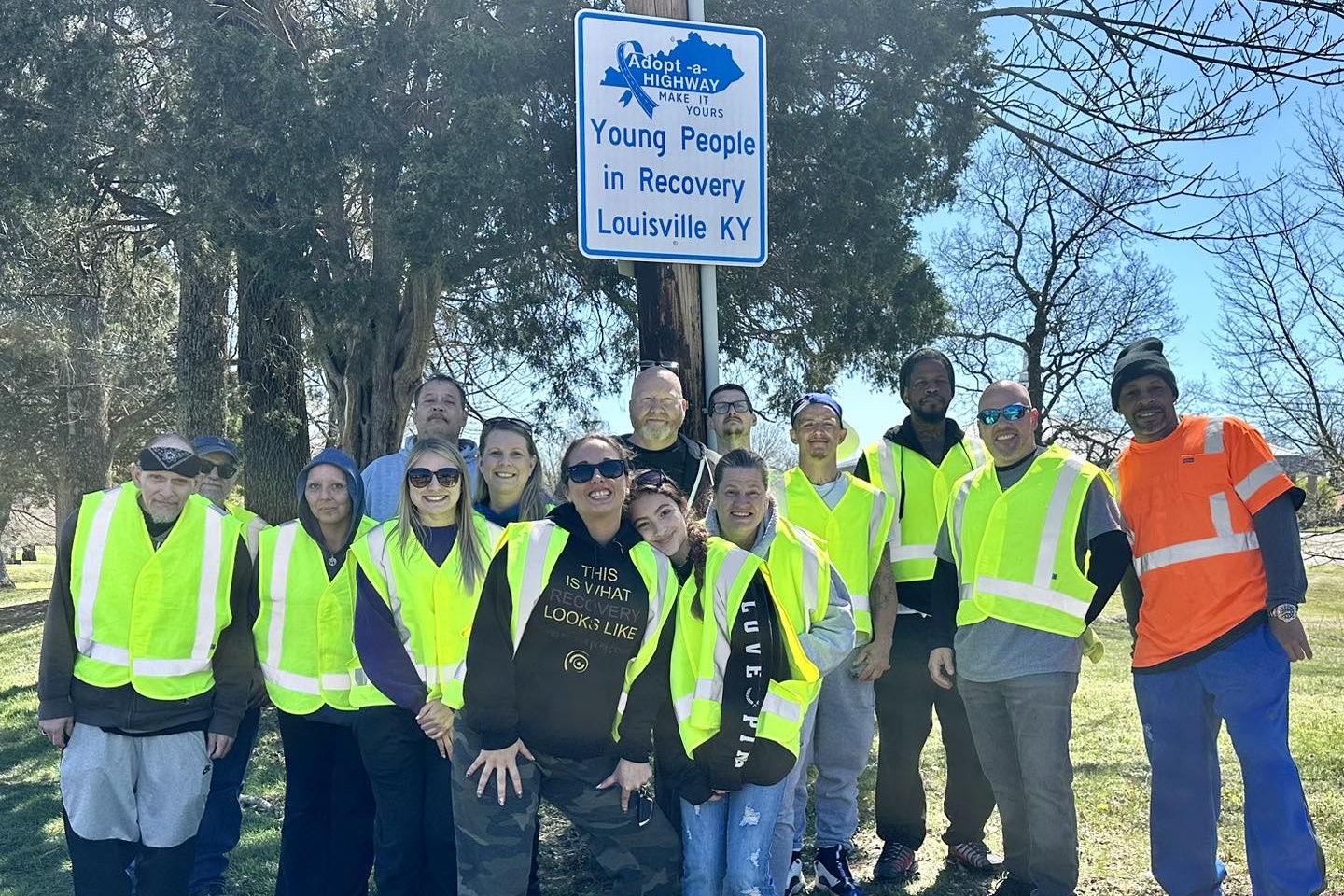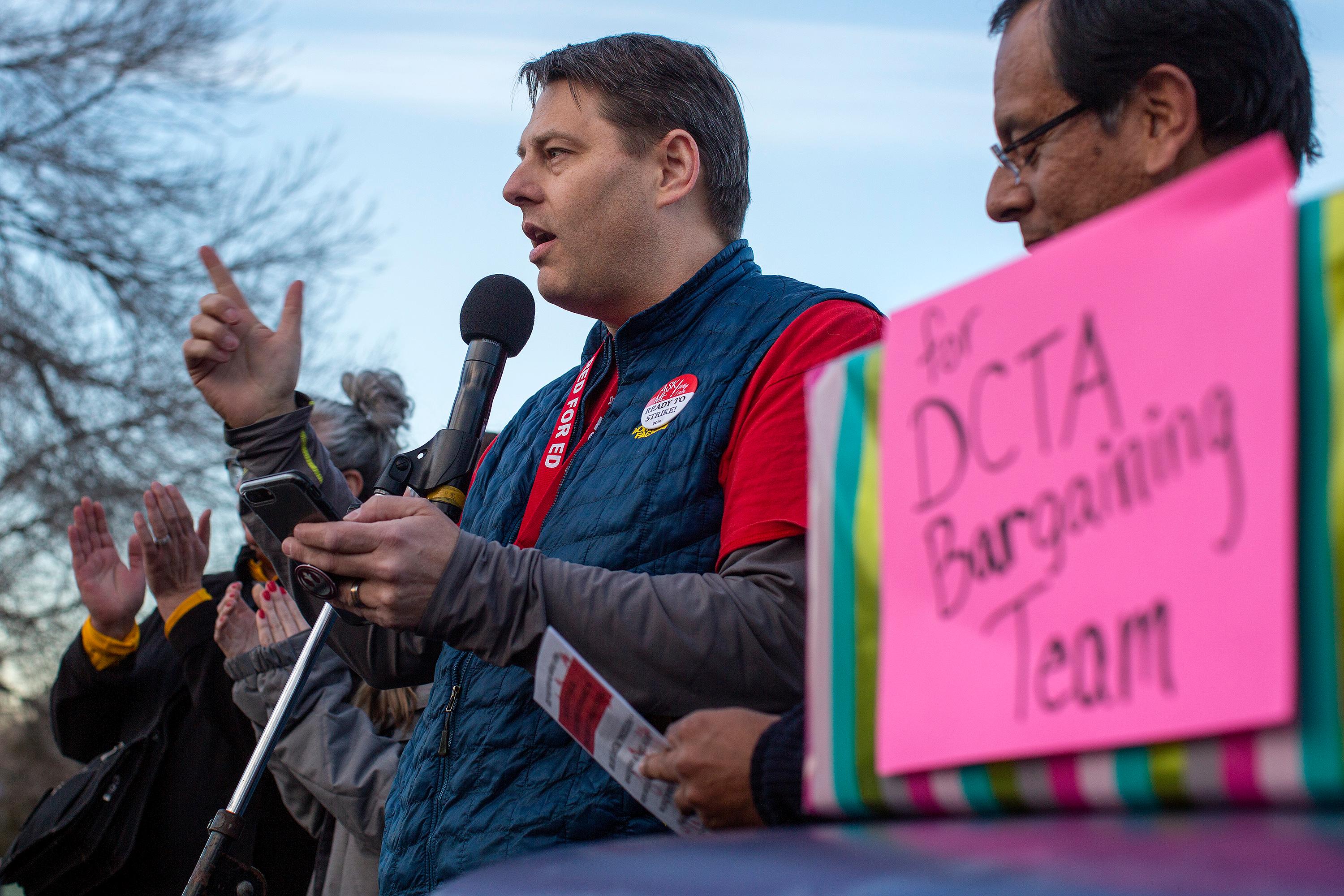

Denver teachers rallied in City Park on Friday afternoon to celebrate a new tentative agreement with Denver Public Schools, and closing out a week of tumult that included a three-day strike, massive protests, and a bargaining session that ended with an all-nighter.
It was Denver’s first teachers strike in 25 years.
The tentative contract gives teachers a significant pay raise, while allowing the district to maintain incentives for teachers at high poverty schools.
Teachers will have the chance to ask questions about the contract at a union meeting at Riverside Baptist Church Tuesday at 4:30 p.m. Voting starts Tuesday evening at the church and will continue through Sunday, Feb. 24. Union members will be able to access online voting, monitored by a third party, without coming to a central location. Results will be announced Monday, February 25.

On Friday afternoon, union leaders and strike captains spoke from the back of a pickup truck in front of City Park’s Martin Luther King Jr. statue.
“Educators in Denver Public Schools now have a fair, predictable, and transparent salary structure that will serve to retain our experienced educators,” said Denver Classroom Teachers Association lead negotiator Rob Gould.
He ticked off the victories he says teachers won:
- An 11.7 percent pay increase for next year and two cost of living increases for the years after that.
- A joint study on whether or not incentives increase teacher retention -- the union opposed incentives but compromised for teachers in hard-to-fill positions.
- A study on the needs of specialized service providers including nurses, psychologists, audiologists, speech therapists.
- Instead of financial rewards for teachers at schools with high test scores, schools that have strong supports for the whole child, including mental, social and emotional health will be rewarded.
- And finally, “we got our compensation system on one piece of paper,” said Gould, to cheers.
The rally was also a chance for teachers to take a moment to reflect on the how the strike unified them, giving them a sense of their collective power.
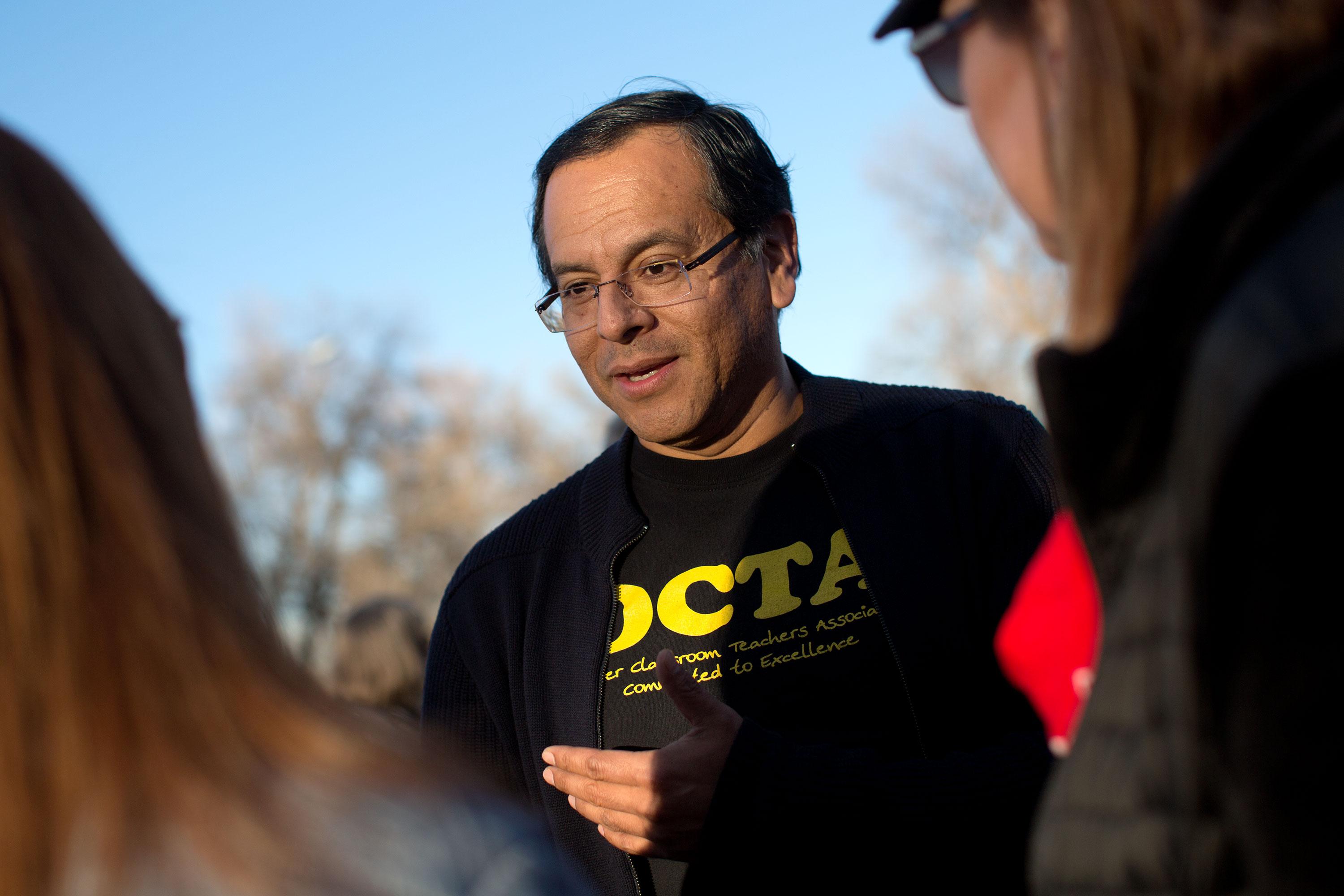
“We have built a movement,” said DCTA president Henry Roman. “This is not a moment.”
Matthew Placido, a teacher at Hill Campus of Arts and Science, recalls a day during the strike when teachers from six elementary and middle schools converged on Carson Elementary to join that school’s picketing teachers. He says as each child arrived to school and crossed the picket line, they went into the playground, turned around, faced the teachers and began chanting along with them.
“For a brief moment in time, the entire community felt like one,” he said to applause.
Eagleton Elementary teacher and strike captain Valerie Lovato recalled a teacher who was in Denver’s 1994 teachers’ strike who flew out from Nevada for the day to join teachers on the picket line.
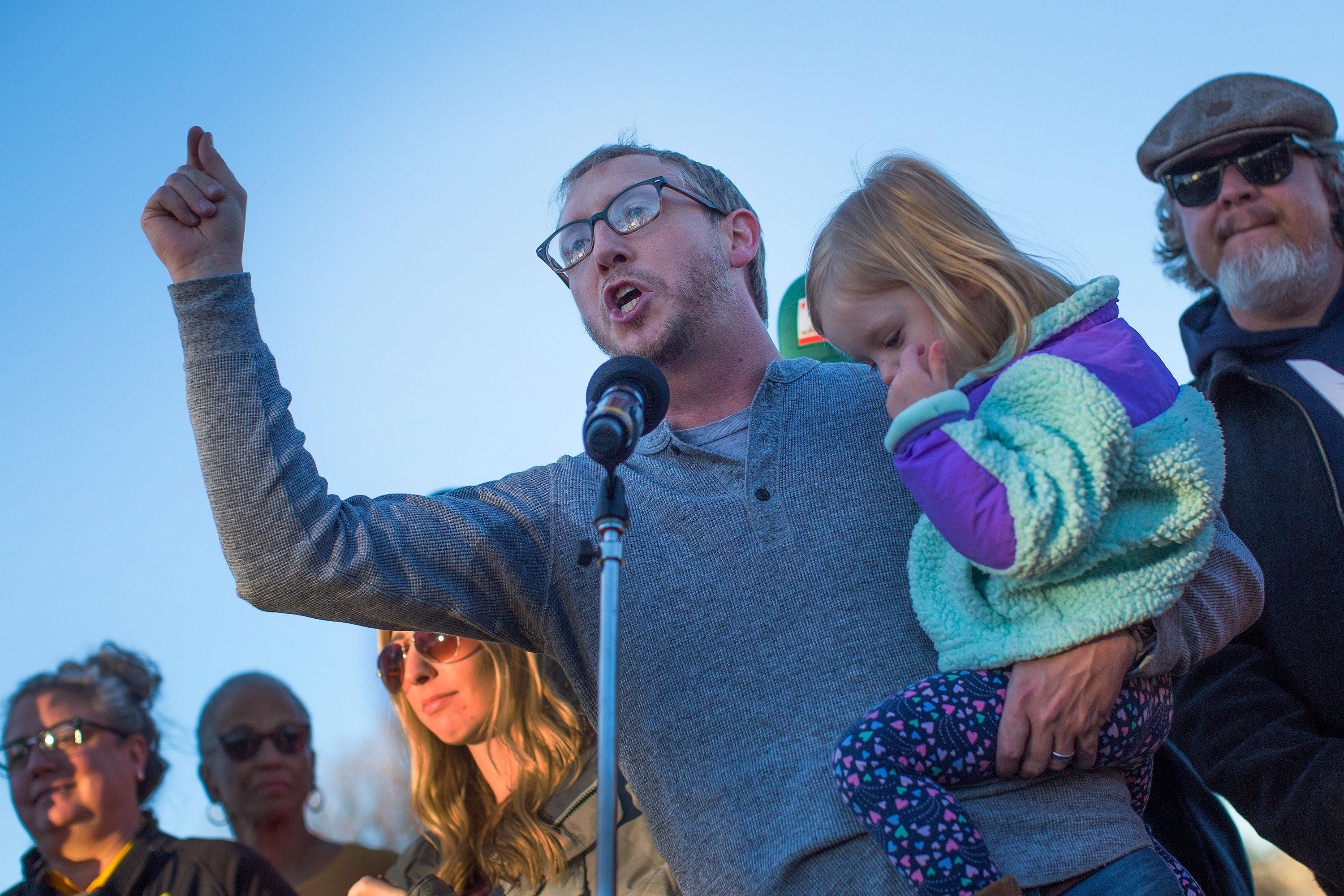
“That is the power we created,” she said.
Several speakers believed that the strike outcome served as an inspiration to other Colorado school districts, and teachers in other states.
“You have woken a giant,” said Josh Downey of the Denver Area Labor Foundation.
Gould urged teachers to stay involved and stay organized.
“For those [teachers] that didn’t go out [to strike], talk to them, don’t demonize them,” he said.
Union leaders thanked city departments, other local unions, the district’s parents and students and school board members Angela Cobian and Jennifer Bacon for their support. The crowd reserved its biggest cheer when DCTA’s Henry Roman singled out board member Carrie Olsen, for being on the picket line every morning, talking to teachers and attending all bargaining sessions.
Kristine Butler, who teaches gifted and talented students at several schools, said she will vote in favor of the contract.
“You're never going to quite please everybody but I think it was a really excellent outcome,” she said.
How The Strike Unfolded

Thursday, July 31 – Negotiations Break Down: DCTA negotiators and supporters reject the latest contract offer from DPS and walk out of an emotional bargaining session. The move brings teachers one step closer to a strike that they had already voted for overwhelmingly. But the walkout is on hold while the state decides to whether to intervene as requested by Denver Public Schools. The Department of Labor and Employment has until Feb. 11 to reach a decision. Intervention could postpone a strike for up to 180 days.
Monday, Feb. 4 – Governor Meets Both Sides: Gov. Jared Polis makes one last attempt to meet with both sides in the labor dispute and broker an agreement, asking both sides to come together to review an informal analysis prepared by his budget office.
Wednesday, Feb. 6 – No State Intervention: The Colorado Department of Labor and Employment and Gov. Jared Polis decide to not intervene, saying the two sides appear close to an agreement, and that the process should be allowed to play out. The teachers restate that they're ready to strike starting the following Monday.
Friday, Feb. 8 – The ProComp Sticking Point: The teachers' unhappiness dates back to 2005, when DPS became the first large urban school district in the nation to experiment with an incentive pay system known as ProComp. Bonuses were to be awarded to encourage teachers to take hard-to-staff positions in high poverty schools or high priority challenged schools. Before long, the system became unwieldy, complicated and unpredictable — and now lies at the core of the dispute between Denver teachers and the district. Can the incentive system be reformed? That's part of the heart of the disagreement between the two sides.

Saturday, Feb. 9 – One Final Try: Tensions boil over as several hours of discussion between the teachers union and DPS come to a halt. Exasperated negotiators for the union asked whether or not Superintendent Susana Cordova would agree to their concept of a salary schedule that gives teachers more opportunities to advance and rewards them for professional development classes. Cordova asked for time to consider their counter-proposal. DCTA lead negotiator Rob Gould tersely responded that they “can have some time, they can have until Tuesday!”
Monday, Feb. 11 – The Strike Is On: Teachers congregate at schools and form picket lines before dawn. The strike will affect 71,000 students across 147 schools. Denver Public Schools does not yet know how many of its 5,353 teachers, social workers, psychologists and speech language pathologists will walk off their jobs. The district keeps K-12 schools open, staffing them with central office employees and substitutes. It quickly becomes apparent that there's near-chaos in some schools, and general confusion in many others. That afternoon, there's a massive, boisterous rally at the state Capitol.

Tuesday, Feb. 12 – Negotiations Restart: Schools are open and teachers are back protesting as both sides restart negotiations Tuesday morning. More than 2,600 teachers, or about 56 percent of the district’s educators, exchanged the classroom for the picket line Monday. The biggest sticking point for the two groups remains how teachers get paid under ProComp. Rob Gould, the lead negotiator for the teacher’s union, said the strike was forcing the district to reconsider its ProComp policies.
Also Tuesday, Feb. 12 – A Lawsuit: More than 10,000 special education students would be "extremely impacted" by the Denver teacher strike, a new class action lawsuit alleges. The suit, brought on behalf of the students against the school district — on the first day of the strike — argues that without trained teachers and caregivers, the students will be put in jeopardy.
Wednesday, Feb: 13 – Getting Closer: Both sides issue a joint statement that expresses hope an agreement will be reached to end the strike. "Today, Denver Public Schools and the Denver Classroom Teachers Association worked in good faith to find common ground on ProComp," the statement read. "We exchanged proposals that are moving us closer and are hopeful that we will get to an agreement soon. However, we need a little more time to resolve the outstanding issues, and we will resume our negotiations tomorrow."
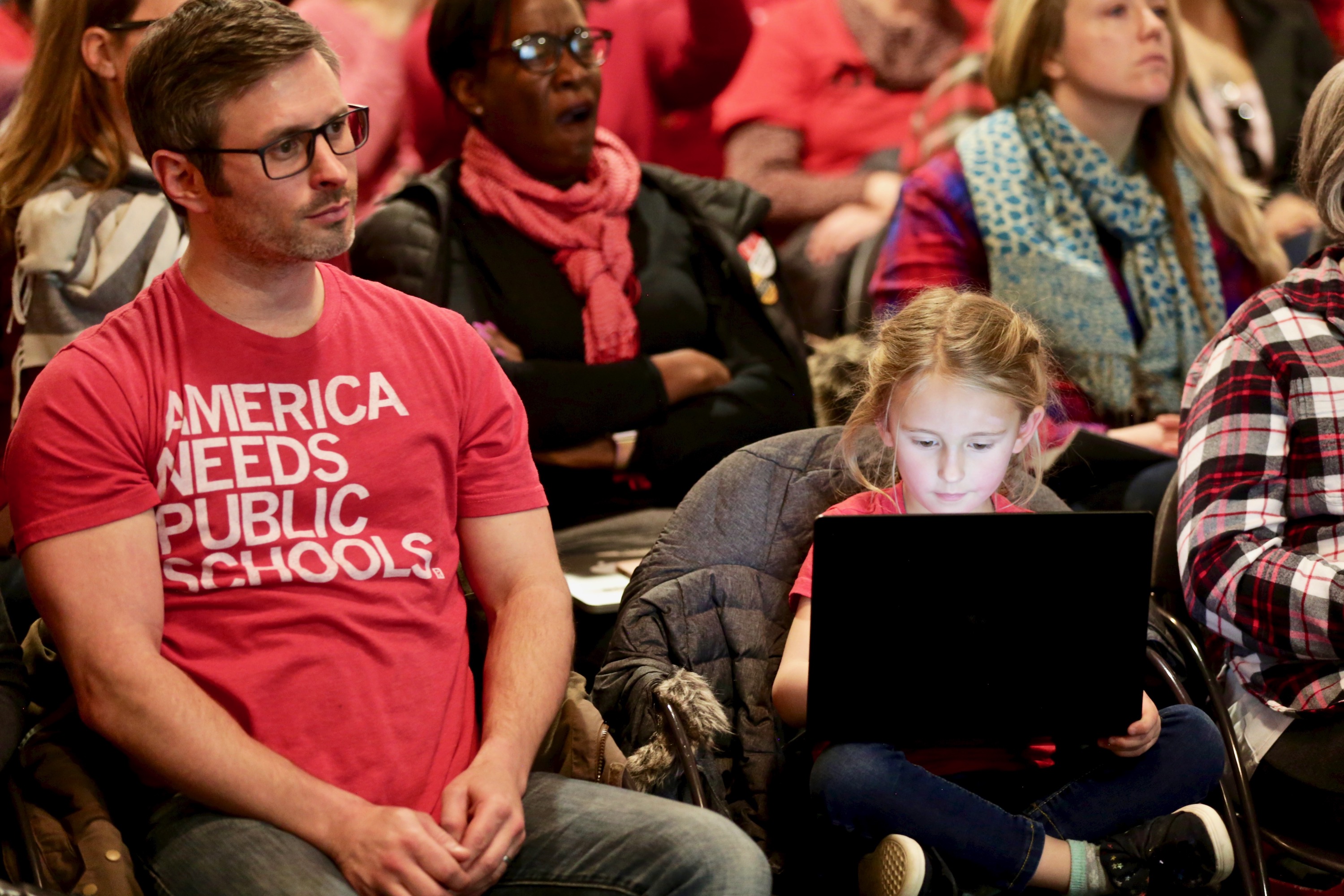
Thursday, Feb. 15 – The All-Nighter: As the hours of bargaining dragged on, the Wednesday session became a Thursday one. Shortly after 5 a.m. bleary-eyed and tired negotiators returned to the room, and lead negotiator Rob Gould said, "This is a comprehensive proposal that will… We think it will end the strike.” In the end they were right. Superintendent Cordova accepted the tentative deal after she recommended one change: “We’d like to add a signature line to the proposal.” After the deal was signed by Cordova and union president Henry Roman, Gould recommend to membership that the strike be ended.
The all-nighter eclipsed the record set in 1994 for the longest bargaining session. The union’s offer agreed to $3,000 retention bonus for high priority schools — with the caveat that study be conducted on their effectiveness — $2,000 incentive for hard to fill and hard to staff schools, and a salary structure that starts at $45,800 with seven lanes and 20 steps for pay advancement. Teachers can use professional development units as credits towards salary advancement and there’s potential to move to a salary of $100,000 with a doctorate.

The deal puts $25.2 million more into base salary, slightly lower than the union’s original ask of $28.5 million. In exchange, the union signed off on the contentious bonuses for high priority schools. Other than the salary structure and professional development to change pay lanes, the incentives had been one of the biggest sticking points in negotiations.
Just hours later at East High School, one of the strike's major picket line sites, teachers gathered outside so they could go back into the building together. Every time another educator joined the crowd, they were met with cheers, hugs and high-fives. Beneath all the celebration, a sense of relief was clear.

